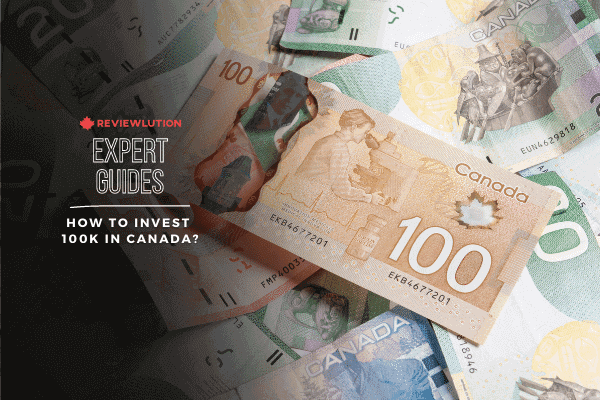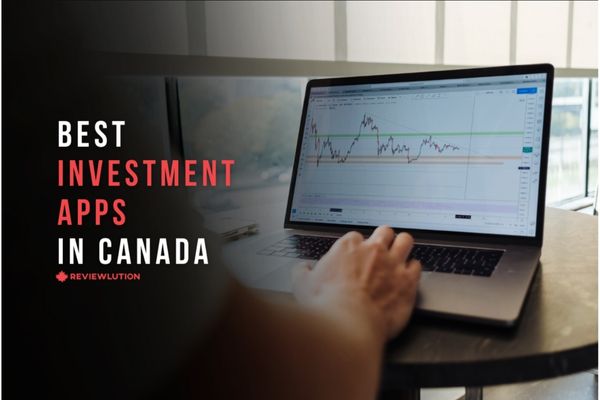Top 10 Safe Investments With High Returns in Canada
With this tumultuous time upon us, saving for the future is a no-brainer. But deciding you want to save is only the tip of the iceberg. Where are you going to put your hard-earned money? Should you invest it somewhere specific or just keep it in a savings account?
Fear no more! As a Canadian, you have numerous options at your disposal to help you do some penny-pinching, and today I’m bringing you the 10 best safe investments with high returns in Canada.
Stick around for the juicy details!
What Are the Best Safe Investments With High Returns in Canada?
Let’s talk about low-risk investments in Canada.
Seasoned investors have determined that a low-risk investment has a low chance of losing your original deposit. Usually, these types of investments have lower returns than higher-risk investments, which is suitable for investors who want to protect their capital and aren’t looking to grow it exponentially.
So is there such a thing as safe investing in Canada?
Fortunately, yes! In fact, all safe investments I’ll mention below have low probabilities of losing your original investment and yield high returns. That’s the dream, right?
Let’s check it out.
High-Interest Savings Account
A high-interest savings account is a type of savings account that offers a higher interest rate than a traditional one and is highly regarded as a safe investment in Canada.
Traditional savings accounts usually have interest rates below 0.5%, which won’t do wonders for your returns. If you choose this option for your investment, your eyes should be on smaller banks that operate entirely online as they typically provide higher interest rates.
For example, EQ Bank offers a Savings Plus Account with a 1.65% interest rate, while Neo Financial’s savings account can earn you 1.80% interest. And since these savings deposits are likely to be insured by the Canada Deposit Insurance Corporation (CDIC), you won’t have to overthink your security.
View this post on Instagram
Guaranteed Investment Certificates and Term Deposits
Guaranteed Investment Certificates (GICs) are one of the highest return investments that offer a guaranteed interest rate for a set period. Most GICs come in terms of 1 to 5 years, so the longer the term you choose, the higher the interest rate you will receive.
There’s a downside though since you will have to pay a high penalty if you withdraw your assets before your term expires, so use GICs only when you’re mindfully saving for a specific costly goal, like a car or a house or if you need to show proof of funds when applying for study permits to Canada.
A term deposit is very similar to a GIC, so much so that they are often used interchangeably.
Government of Canada Treasury Bills
Treasury bills (or T-bills) are short-term debt securities issued by the Government of Canada or any Provincial Government to raise wealth and capital.
So how do T-bills work? Well, you purchase them at a discount and then redeem them at the value they’re actually worth. You can purchase T-bills from most Canadian banks, but you must be cautious regarding the interest rate, as they depend on the Bank of Canada’s overnight interest rate.
Although T-bills might not offer the highest returns, they’re still considered one of the best low-risk investments in Canada.
Money Market Funds
A money market fund is a type of mutual fund that invests in cash, short-term securities and assets with high liquidity, such as Treasury bills, commercial paper, and certificates of deposit.
Typically, money market funds are offered by asset management companies. However, although this is an investment with low risk and with high returns, it has been downgraded by inflation and the management expense ratio (MER). Therefore, if you have a choice on where to invest, I’d still recommend sticking with the other options until things settle.
Bonds
A bond is a type of debt security that pays periodic interest payments, known as coupons and returns the face value of the bond at maturity, along with interest.
Municipal, provincial, and federal governments alike can issue bonds which come in terms of 1 to 30 years. Aside from these, there are also corporate bonds issued by companies (like banks). If you’re not sure which one is right for you, remember that although government bonds are safer, corporate bonds come with higher returns.
A great example of a government bond is the Canada Learning Bond which helps you save for your kids’ future.
NHA Mortgage-Backed Securities
NHA mortgage-backed securities (or MBS) are bonds that are backed by the Canadian government. You can buy these assets through a bank, credit union, or insurance company.
At the crux of it, MBS are debt securities comprised of a collection of insured mortgages that allow investors to invest and then pay back their mortgages when they become homeowners. Subsequently, investors receive regular payments. Therefore, if you’re looking to buy a house in Canada, this investment can significantly back you up.
Moreover, since MBS are an insured and safe investment in Canada, your principal interests are protected by the Canada Mortgage and Housing Corporation (CMHC).
Fixed Annuities
For newbie investors, a fixed annuity is a type of insurance product that pays a fixed rate of interest for a set time and is one of the best low-risk investments in Canada. They’re usually issued by life insurance companies.
If you’ve ever heard talks about annuities, they’re generally connected to retirement savings, which also makes them stable and safe investments for seniors in Canada. In fact, annuities are popular among retirees because they provide regular payments over several years, which greatly facilitates creating income during retirement.
Moreover, if a retiree has passed but had named a beneficiary on their annuity beforehand, the beneficiary may be eligible for a payout.
For more information on annuities, check out this helpful guide.
Dividend-Paying Stocks
A dividend-paying stock is a type of stock that pays periodic cash dividends to shareholders. These shares are publicly traded on the Toronto Stock Exchange and comprise a low-risk investment.
Usually, the companies that offer dividend-paying stocks with high returns are profitable and operate in the energy, financial, and asset management sectors. Some lucrative dividend-paying stocks you might consider investing in are the following: Enbridge Inc, Royal Bank of Canada, Toronto Dominion Bank, Canadian Imperial Bank of Commerce, etc.
Additionally, investing in these stocks will help diversify your portfolio and provide you with a passive revenue stream.
To effectively track your dividends, check out the best investment apps in Canada.
Fractional Shares
A fractional share is a type of investment that allows you to invest in a company without having to buy an entire share, allowing you to both invest and save simultaneously. Buying a fractional share can trade stocks with a reasonable budget and little-to-no risk.
But why is this an investment with low risk? Well, you can buy shares from many companies in different industries for as little as $1 and earn a fractional part of the revenue. Moreover, they will diversify your portfolio and facilitate the investing process.
If you’re looking to invest in stocks, read up on the best Canadian stock trading apps to keep up with the ever-changing flow.
Index Funds
Index funds are types of mutual funds that passively track a specific market index. The funds, bonds, and stocks are tracked based on their weight in the index and can help you prevent any significant loss from stock prices suddenly dipping.
Index funds are most popular among passive investors with a focus on long-term growth because they build diversification and provide access to all stocks in a single market. Moreover, these types of funds don’t require any active management and come with relatively low fees compared to other investments.
Segregated Funds
Last but not least, a segregated fund is like an insurance plan with some additional features offered by insurance companies. Generally, investors use segregated funds to manage annuities.
The way this fund works is simple – individual and group funds are pooled and invested in a portfolio, where many investors have a share. Therefore, risks and benefits surrounding the fund are shared amongst all those who have invested. Segregated funds also provide life insurance benefits and generate capital gains.
Because of the built-in death benefit feature and the guaranteed principal investment, segregated funds are a superb option for safe investing in Canada.
How To Choose the Right Investment?
The tricky part before investing is choosing the best option for you. So, you’ll need to consider 3 factors: your financial condition, risk tolerance, and investment goal.
Financial Condition
Your financial condition is the first thing to discuss when choosing an investment. Therefore, you need to ask yourself how much money you have to invest and whether you can afford to lose any of it. So, if you have a limited amount, you may want to consider a low-risk investment with lower returns.
Plus, it’s essential to keep in mind how much you need to live comfortably to avoid dipping into the money you need to keep up with your lifestyle. After all, investments should be a way to increase your savings, not cause you to go into debt.
Risk Tolerance
Taking your risk tolerance into consideration can help you decide more easily. So, you have to ask yourself how much risk you’re willing to take with your investment. If you’re entirely risk-averse, you might want to opt for a traditional savings account or a tax-free savings account.
Remember that all investments come with some sort of risk. However, it’s completely up to you to determine what you’re comfortable with and what will cause you the least anxiety about your assets.
Investment goal
Your investment goal is also of the utmost importance when choosing an investment option. Namely, ask yourself what you want to achieve with your investment. If you’re looking for income, you should consider an investment that pays dividends. But, if you want capital appreciation, your choice should be stocks or mutual funds.
Whatever it is, ensure it aligns with your lifestyle and your ability to attain it.
Finishing Thoughts
That’s all I’ve got for you regarding safe investments with high returns in Canada.
At the end of the day, there is no one-size-fits-all answer to the question of the best investment because it depends on multiple factors. If you’ve realized that you can’t decide by yourself, speak to a financial advisor to get personalized advice on what is right for you.
Happy investing!
FAQ
Investments with the best returns in Canada are high-interest savings accounts, GICs, T-bills, bonds, dividend-paying stocks, annuities, MBS, fractional shares, index funds, and segregated funds.
The safest investment with the highest return is a high-interest savings account. Alternatively, you can opt for a GIC.
Objectively speaking, an ETF is the best investment in Canada for 2022, boasting returns of 13%. However, ETFs can generate high fees, have low liquidity, and be tax-inefficient, which doesn’t make them the safest option.
To ensure your money is secure, you should put your money in a government-guaranteed account, i.e. an account at a CDIC member institution.











